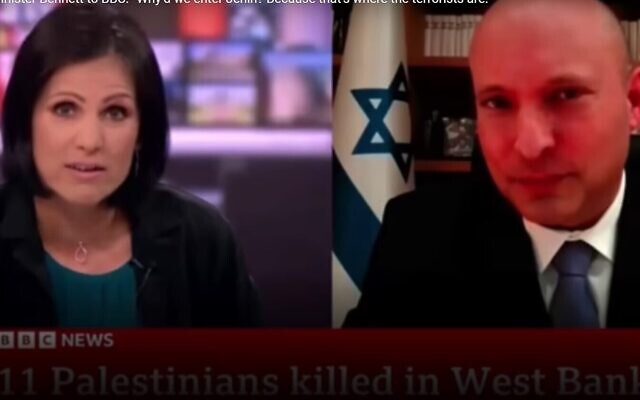BBC anchor to ex-Israeli PM: ‘Israeli forces are happy to kill children?’
Naftali Bennett says all the Palestinians killed in West Bank incursion were combatants. ‘Terrorists — but children,’ responds interviewer Anjana Gadgil
(Times of Israel) Former prime minister Naftali Bennett was asked by a BBC News anchor in an interview whether the Israel Defence Forces “are happy to kill children” in last week’s Jenin operation.
The interview aired last Tuesday, with anchor Anjana Gadgil repeatedly insisting that armed gunmen in their teens killed in exchanges of fire were children.
The Israeli military has said all those killed in the two-day operation were combatants.
“The Israeli military are calling this a military operation but we now know that young people are being killed, four of them under 18. Is that really what the military set out to do, to kill people between the ages of 16 and 18?” Gadgil asked.
Bennett, apparently taken aback, responded that those killed had taken up arms and were involved in attacks targeting civilians as well.
“All the Palestinians that were killed are terrorists in this case,” he said.
“Terrorists — but children. The Israeli forces are happy to kill children?” replied Gadgil.
“You know it’s quite remarkable that you’d say that, because they’re killing us,” Bennett answered. He then asked Gadgil twice whether she’d refer to someone shooting at her family as a child. The host refused to answer, saying this was irrelevant.
“We’re not talking about that. The UN have defined them as children,” she said.
“I’m missing something,” Bennett said. “You know a 17-year-old terrorist can murder civilians.” He bristled at Gadgil “creating this moral equivalence” between the sides.
The ex-premier has received some public praise in Israel for his defence of the government and its conduct during the operation, despite his differences with many of its policies.
Public Diplomacy Minister Galit Distel Atbaryan, speaking to Israel’s Channel 12 about the BBC incident, said Bennett “was excellent” on the broadcast.
In a tweet last Wednesday night, Bennett said that he demanded an official apology from the BBC immediately after the interview, which also led to a number of online complaints and condemnations
“We will not remain silent about the honour of the State of Israel,” Bennett said.
The BBC issued a statement Wednesday night arguing that it had covered the events “in an impartial and robust way” and that the United Nations “raised the issue of the impact of the operation in Jenin on children and young people.”
“While this was a legitimate subject to examine in the interview, we apologise that the language used in this line of questioning was not phrased well and was inappropriate,” the BBC said.


comments